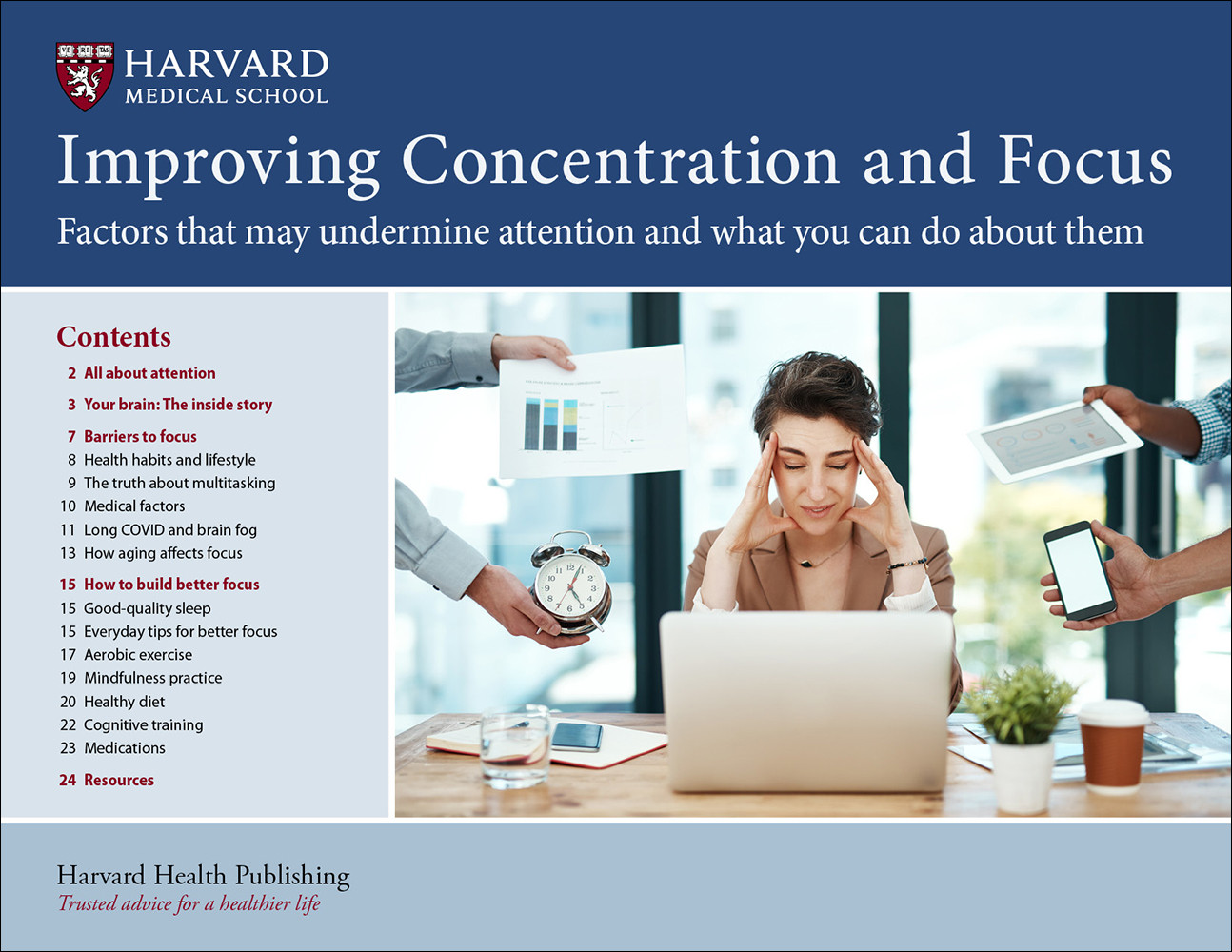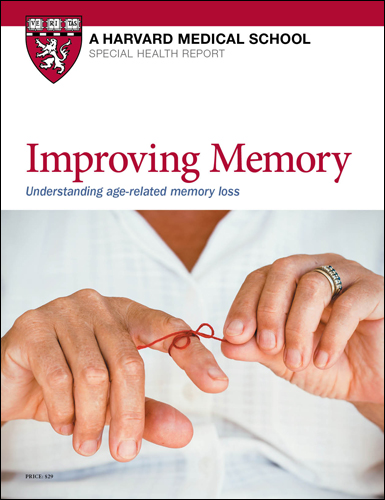
5 timeless habits for better health

What are the symptoms of prostate cancer?

Is your breakfast cereal healthy?

When pain signals an emergency: Symptoms you should never ignore

Does exercise give you energy?

Acupuncture for pain relief: How it works and what to expect

How to avoid jet lag: Tips for staying alert when you travel

Biofeedback therapy: How it works and how it can help relieve pain

Best vitamins and minerals for energy

Should you take probiotics with antibiotics?


Improving Concentration and Focus
This instructive guide from Harvard Medical School offers practical, proven, commonsense strategies to recapture your concentration and maintain your brain’s alertness and fitness. Improving Concentration and Focus addresses four focus-hindering factors you can control. You’ll discover why multi-tasking can actually erode memory skills and learn ways to give your brain essential “downtime.” You’ll also learn what you can do to improve cognitive function and speed.
Other Product Information
The dog barks. Someone turns on the TV. Your neighbor starts his lawnmower. Your cellphone buzzes. Your computer beeps. And you lose your concentration—again.
Focus is disrupted. Thoughts interrupted. Distractions hijack our attention and scuttle our best intentions. You don’t have to let them!
This Harvard Medical School guide will show you how to sideline distractions and sustain your focus, enhance your memory and cement attention.
Keep your train of thought securely on track!
When your mind wanders, you know how hard it can often be to remember where you left off and what you were thinking.
This guide exposes the barriers to focus. You’ll find how to keep distractions at arm’s length and bolster your brain’s agility, resiliency, and ability to recall information and retain thought.
In this instructive guide, Harvard Medical School doctors share the keys to fortifying your brain’s good health and fostering its facility for concentration.
The report addresses four focus-hindering factors you can control. You’ll discover why multi-tasking can actually erode memory skills. You’ll find how to give your brain essential “downtime.” And you’ll learn the one thing you can do right now to improve cognitive function and speed.
You can keep your mind on what matters. The guide offers practical, proven, commonsense strategies to recapture your concentration and maintain your brain’s alertness and fitness.
You’ll tune up your ability to tune out distractions. You’ll discover the ingredients of a brain-healthy diet. You’ll learn how to assure a restorative night’s sleep…two surprisingly easy ways to offset age-related brain changes…and much more.
Prepared by the editors of Harvard Health Publishing in consultation with Kim Willment, PhD Assistant Professor of Neurology, Harvard Medical School Director, RENEW Brain and Wellness Support Services, Center for Brain/Mind Medicine, Brigham and Women’s Hospital. 25 Pages (2025)
About Harvard Medical School Guides
Harvard Medical School Guides delivers compact, practical information on important health concerns. These publications are smaller in scope than our Special Health Reports, but they are written in the same clear, easy-to-understand language, and they provide the authoritative health advice you expect from Harvard Health Publishing.
The truth about multitasking
“I’m an excellent multitasker.” This familiar boast can be heard from people who pride themselves on their productivity. Indeed, developing an aptitude for doing several things at the same time seems like an ideal solution for managing the endless flow of information that comes our way daily. But this strategy may not be as successful as it appears.
Media multitaskers claim they can seamlessly engage in numerous mental processes at the same time, such as reading emails while shopping online or using the phone while driving. Neuroscientists, however, are not so sure. The prevailing understanding of human cognition holds that the brain can process only one string of information at a time.
Scientists surmise that high multitaskers are unknowingly spreading their attention over a large scope of information and switching their focus back and forth between tasks. This observation has been supported by studies using functional magnetic resonance imaging (fMRI) that highlight increased brain activity in specific regions while switching between tasks. These images showed that the act of jumping from task to task took a greater toll on brain power than focusing only on one task.
Researchers also investigated the premise that high multitaskers might be able to retain more information in working memory than most people. However, subsequent studies showed that heavy media multitaskers performed worse on tests of working memory even in the absence of external distractions. These deficits in working memory ultimately lead to problems encoding information into longterm memory.
Particularly striking is the effect that driving and talking on a cellphone—a form of multitasking—has on driving ability. Using a driving simulator, researchers found that drivers talking on a cell phone—even a hands-free device—were slower to step on the brakes and were involved in more simulated traffic accidents than intoxicated drivers.
Ultimately, habitual multitaskers appear to have trouble navigating among multiple threads of information. Therefore, they are less able to screen out distractions to focus on the material that’s relevant to their goal
- All about attention
- Your brain: The inside story
- Attention, focus, and concentration
- Cognitive control and the prefrontal cortex
- The six cognitive domains
- Information highway
- The role of neurotransmitters in attention
- Barriers to focus
- Poor-quality sleep
- Digital distractions
- The truth about multitasking
- Obesity
- Traumatic brain injury
- Alcohol and drug use
- Medications that undermine focus
- Stress
- Depression and anxiety
- Adult ADHD
- How aging affects focus
- Heart disease, stroke, and blood vessel problems
- Cancer and cancer treatment
- Dementia
- Tips for better focus
- Good-quality sleep
- Caffeine and attention
- Aerobic exercise
- Mindfulness practice
- Find your phone-life balance
- Healthy diet
- Cognitive training
- Medications
- Conquering distractions and finding focus
- All about attention
- Your brain: The inside story
- Attention, focus, and concentration
- Cognitive control and the prefrontal cortex
- The six cognitive domains
- Information highway
- The role of neurotransmitters in attention
- Barriers to focus
- Poor-quality sleep
- Digital distractions
- The truth about multitasking
- Obesity
- Traumatic brain injury
- Alcohol and drug use
- Medications that undermine focus
- Stress
- Depression and anxiety
- Adult ADHD
- How aging affects focus
- Heart disease, stroke, and blood vessel problems
- Cancer and cancer treatment
- Dementia
- Tips for better focus
- Good-quality sleep
- Caffeine and attention
- Aerobic exercise
- Mindfulness practice
- Find your phone-life balance
- Healthy diet
- Cognitive training
- Medications
- Conquering distractions and finding focus
You might also be interested in…

Improving Memory: Understanding age-related memory loss
By age 60, more than half of adults have concerns about their memory. However, minor memory lapses that occur with age are not usually signs of a serious problem, such as Alzheimer’s disease, but rather the result of normal changes in the structure and function of the brain. This report, Improving Memory: Understanding age-related memory loss, describes these normal age-related changes and other more serious causes of memory loss — and how to distinguish between them.

5 timeless habits for better health

What are the symptoms of prostate cancer?

Is your breakfast cereal healthy?

When pain signals an emergency: Symptoms you should never ignore

Does exercise give you energy?

Acupuncture for pain relief: How it works and what to expect

How to avoid jet lag: Tips for staying alert when you travel

Biofeedback therapy: How it works and how it can help relieve pain

Best vitamins and minerals for energy

Should you take probiotics with antibiotics?
Free Healthbeat Signup
Get the latest in health news delivered to your inbox!
Sign Up